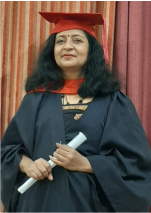Every ordinary teacher around the world had the potential to become an intellectual-Dr Simita Sharan
Four Teachers from Three Diverse Countries Feature in Doctoral Research BY: Dr Simita Sharan of New Delhi focussed her doctoral studies on four teachers from three culturally, socially, and racially different countries during her journey to achieve her PhD degree in Education

The countries were Sharan’s homeland, India, and the United States and Côte d’Ivoire and the research involved exploring the phenomenon of exceptionality as a possibility for doing teacher’s work as intellectuals.Married to a diplomat, Sharan often travelled with her husband to different countries where he was employed as a senior Indian foreign service officer.
She worked as a teacher in several countries interacting with colleagues in a variety of very different learning settings. During these experiences she realised that even though the teachers encouraged new thinking and learning among their students, most of them adopted formulaic positions in teaching their respective subjects.
‘Growing up in India and obtaining my degrees there as well as in the USA, I vividly remember teachers who influenced my thinking and aspirations as an Indian woman and a teacher,’ said Sharan. ‘They encouraged me to imagine possibilities beyond the norms and practices prescribing what it means to a woman. I learned from them the significant responsibility teachers exercise in students’ lives.’
Sharan recognised that such individuals chose to go beyond the instrumentalist job of teaching their subjects, to also inspiring them to think in alternate ways. She wondered why these teachers chose to transcend the traditional, comfortable, and established norms and practices.
‘This curiosity inspired my doctoral study on “exceptional teachers”. I sought to understand who these teachers are and the sources of the formation for their alternate ways of thinking and practising. I was also encouraged by how and why they used their teacher’s position in ways that made them exceptional,’ said Sharan.
Due to the global nature of the study, Sharan travelled between three different countries. ‘It was a time-consuming and financially demanding endeavour. I also needed to educate myself about the culture of these particular countries in order to develop a rapport with the participant teachers and to understand their stories in more unbiased, open, logical, and critical ways.’
As a women researcher in a patriarchal society, she had to keep compromising on the time spent on this study. ‘Because of my position as the wife of an Indian diplomat, I was obliged to perform certain duties and tasks for my country. I had always been busy in entertaining a constant flow of visitors from around the world. As a mother, I was fully involved in the lives of my daughters who were studying in the USA. One of them also got married which is a very big event in India. This kept me on my toes for more than six months.’
Sharan’s study revealed that every ordinary teacher around the world had the potential to become an intellectual and exceptional teacher and experience teaching as intellectual work if he/she cared for an ethically embodied understanding of self and the students.
She argues that pre-service and in-service teachers should be encouraged to focus on their selves as the site for transformation from their traditional and orthodox beliefs and values for them and their students’ intellectual, ethical, and emotional well-being.
‘When teachers are ethically responsible and responsive individuals, they can develop perspectives and make choices in their everyday lives enabling them to transgress the traditional boundaries of being professional and to actively practise teachers’ work in “exceptional” ways for their care for their students,’ said Sharan.
Despite the patriarchal and closed mind approaches of many people who scoffed at her attempt of studying in her 40s and 50s, she had a very close and supportive group of friends, family and her supervisor Professor Daisy Pillay who encouraged her.
Offering advice to other researchers, Sharan said: ‘Perseverance is the key to success. There will be moments of sheer frustration when you doubt your own abilities and choices. But do not lose hope and faith. Dedicate yourself to your study completely and you will certainly reach your goal.’
Her daughter Antara said, ‘Finally, you focused on yourself and because of your hard work and dedication, we are so proud to call you Dr Simita Sharan! I am not surprised at all of your achievements because you always complete what you start. This is a perfect example that it’s never too late to start something new in your life.’
Her other daughter Arushi added, ‘Throughout her PhD journey, she has elegantly balanced her roles as a mother, wife, sister, friend, aunt and so much more, while burning the midnight oil to deep dive into her research. Despite the consistent changes that come with being a diplomat’s wife, she always perseveres and adapts. She is Dr Simita Sharan, my breath-taking mother! Congrats on achieving your doctoral degree, Mommy!’







